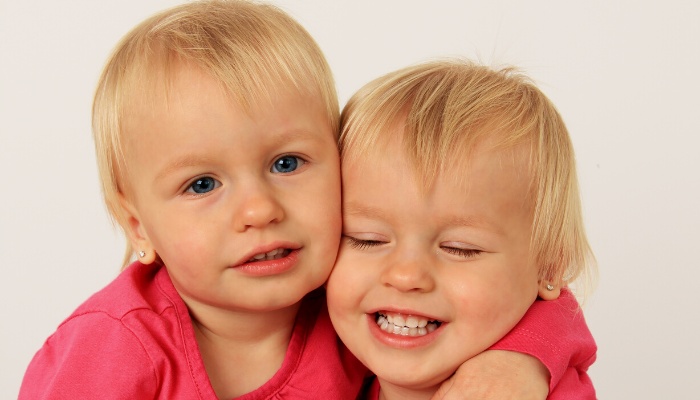Upon the birth of my twins, I immediately recognized the strong connection they shared. As they were delivered from my body, they instinctively reached for each other’s hands and became upset when unable to physically connect.
It was something I hadn’t experienced with my singletons, and it added another aspect to parenting twins.
Separation anxiety in twins is common, and twins tend to be more likely to deal with separation anxiety than other siblings. There are different theories for why this happens, and adult twins often report that loneliness is a bigger issue for them than their non-twin siblings.
Recognizing the signs of twin separation anxiety and knowing how to handle it in your children can help them better handle the emotions related to this issue.
Twin separation anxiety has things in common with generalized anxiety, but it’s different in a lot of ways as well.
Understanding Separation Anxiety in Twins
Twin separation anxiety occurs when twins have a hard time being apart. This anxiety can reach a point where it impacts your child’s ability to carry out everyday events.
The Unique Bond Between Twins
Twins share a womb, and singletons will never know how this experience feels. My girls wanted to touch each other the minute they left the womb.
They touched each other’s hands when they nursed, and they found each other when put down because they got stressed when they didn’t know where the other one was.
Identical twins come from the same fertilized egg, meaning they are genetically as similar as two people can be. It’s a unique bond.
Even so, you don’t want this bond to become so interdependent that your children feel they cannot live without their twin in their presence at all times.
It can be stifling for both of them and keep them from developing meaningful relationships outside of their twin relationship.
The bond between twins can be honored without sacrificing the mental health of either sibling.
Causes of Twin Separation Anxiety
Your twins may experience separation anxiety when they can’t see each other or don’t know what the other one is doing.
This can trigger a panic that leaves them experiencing symptoms of anxiety, such as high heart rate.
When Twin Separation Anxiety Is Most Likely To Occur
Your twins are most likely going to struggle being apart, even when they are young.
You will notice it may be more than just a phase and could be twin separation anxiety when it affects their ability to function without each other near. One or both twins may struggle.
My girls were around 7 years old when they started play therapy for separation anxiety.
We had noticed fits, sadness, and an unwillingness to separate from each other even when it would have helped both of them calm down.
They did not want to go on individual planned outings with me, opting instead to only go if they could be together.
School age can be a time when you see anxiety about being apart hit an all-time high. If it doesn’t calm down, you may need to see if your children are struggling with twin separation anxiety.
Separation Anxiety in Identical vs. Fraternal Twins
Both types of twins can experience separation anxiety though there are no definitive numbers to say if identical twins experience this type of anxiety more.
Much depends on how close they are and what efforts have been made to encourage individualism.
Signs of Twin Separation Anxiety
Signs of twin separation anxiety include:
- A twin worrying about their twin sibling excessively.
- Refusing to be away from their twin.
- Panicking when their twin is not in sight.
- Trouble sleeping or doing any activity without their twin present.
Can Twin Separation Anxiety Be Prevented?
There may not be a way to completely prevent a twin from struggling with separation anxiety. However, you may be able to lessen the impact by using some strategies. They include:
- Preparing your twins for times they will have to be apart and letting them know the separation is not permanent.
- Therapy can help twins sort through their feelings of separation anxiety.
- Putting emphasis on the fact that your twins are individuals and celebrating the things they do on their own as well as the things they do as twins.
- Making sure other caregivers know not to use separation as a discipline or punishment technique.

Helping Twins With Separation Anxiety
Most twins, especially identical pairs, will deal with separation anxiety at some point in life.
Even if you can’t prevent it, you can find ways to help your twins when they do feel anxious about being away from their twin.
Twin Separation Anxiety in Adults
Adult twins can experience separation anxiety that has the potential to impact their lives.
Some twins choose to live together simply because they want to, and others choose to live together because anxiety drives them.
Having other friendships or intimate relationships can be hard for twins who struggle with twin separation anxiety since they keep their siblings as their primary priority.
It’s a good idea to help your twins learn how to manage twin separation anxiety when they are young so there is less of a chance that they will get to adulthood without any coping mechanisms to help their mental health.
The flipside to having a twin you love: it can lengthen your life. Twins are shown to live longer than singletons.
Fraternal twins live longer than singletons, and identical twins live even longer than fraternal twins.
The reasoning behind this is likely the fact that twins don’t get as lonely, and loneliness is known to shorten a person’s life span.
While attached anxiety is not the goal, a solid twin relationship can positively impact your children’s longevity.
Related Questions:
Do Twins Have a Hard Time Being Alone?
Every person is different. While twins tend to spend a lot of time together, starting in the womb, they may enjoy alone time as they age.
Some adult twins choose to live together throughout life, but others may choose to go to separate colleges and be on their own. Not every set of twins is the same.
My twins can spend hours together, but they also know how to spend time on their own now, and they know how to ask for that time.
Therapy helped them realize that it was okay to operate as individuals. Neither of them struggles with being alone anymore, but they love being together and with their friends when they choose to be.
What Are the Psychological Effects of Separating Twins?
Separating twins at birth or at some point during life in a permanent way can have very damaging psychological effects.
However, having your kids in different classrooms at school or in different extracurricular activities is not the same thing.
Long-term separation can absolutely devastate twins, but time to pursue their own independence is fine as long as they are not separated indefinitely or as some sort of punishment.
Closing Thoughts
Twins are used to being together from the moment of conception, and they may experience anxiety when apart.
Knowing what you can expect and what you can do to help your twins navigate the stress that comes from being separated can help your children become confident in who they are as individuals and better able to cope with being on their own occasionally.
Kristy is the mother of four, including identical twins. With a background in education and research, she is constantly learning more about parenting and raising multiples. When she has spare time, she enjoys hiking into the woods with a great book to take a break.

